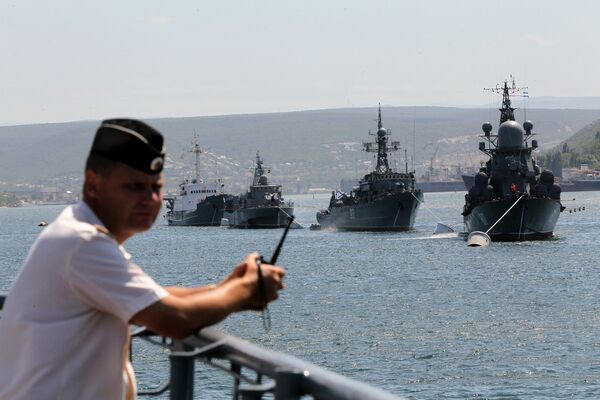The Black Sea Naval Cooperation Task Group (Blackseafor) is holding regularly scheduled exercises on the Black Sea. Political analyst Viktor Nadein-Rayevsky, a senior fellow of the Russian Academy of Sciences’ Institute of World Economy and International Relations, shared his views on Blackseafor’s activities and the development of this collective security system on the Black Sea.
What do you think about the activities of the Blackseafor task group? Do its stated goals – for example, fighting terrorism – coincide with its real intentions?
An organization can declare universally beneficial goals, but the truth is the members of that organization are not always interested in pursuing them. Usually, each state is pursuing its own national interests.
However, Blackseafor’s stated goal of ensuring security on the Black Sea is, in fact, a response to a pressing need. There is a pipeline between Russia and Turkey running along the bottom of the Black Sea, and work is set to begin on the South Stream pipeline. Fortunately, there has never been an act of sabotage on a deep-water pipeline, but still the member states of Blackseafor must continue to promote security on the Black Sea.
The threat of piracy is also very real. In light of the growing danger of piracy in other parts of the world, it would be sensible to think about security on the Black Sea in this context, especially given that there have already been acts of piracy here, like the seizure of the Russian ferry Avrasya in 1996 during the first Chechen war. Obviously, the Black Sea countries must work together to prevent acts of piracy and to respond effectively in the event that a ship is taken over. Again, it is the Black Sea countries that have to take responsibility for this. Lately, some experts have been talking about bringing NATO members outside the Black Sea region into Blackseafor. The United States, in particular, is constantly trying to participate in Blackseafor maneuvers, for instance, as part of the Ukrainian fleet. Now not only Turkey but also Bulgaria and Romania are NATO members. This is why Russia wants to see the Black Sea remain a sea for the countries on its shores.
What do you think about Georgia’s refusal to take part in the Blackseafor exercises?
Georgia’s refusal was entirely predictable, considering the standoff between Moscow and Tbilisi following the events of August 2008. Russia’s decision to deploy S-300 missile systems on Abkhazian soil has poured gas on the fire. South Ossetia’s request for Russian missiles has also caused outrage among the Georgian leadership. So Russia was not surprised by Georgia’s refusal to take part in the Blackseafor exercises.
Although there are NATO members in Blackseafor, could these exercises be viewed as an effort to counter NATO’s attempts, particularly the United States, to expand its sphere of influence into the Black Sea?
Considering that Turkey, Romania and Bulgaria are NATO members, it would be incorrect to see these exercises as an effort to counter NATO, especially now that the United States has military bases in Romania and Bulgaria. As for Turkey, it remains an active NATO member, but unlike many other countries, it is pursuing a foreign policy based on its own national interests, despite its NATO membership. Its national interests do not include the expansion of the influence of other NATO members in this region.
The issue here is not to counter anything, but rather to maintain the status quo in the region. Even the slightest shift, including one in favor of a NATO member outside the Black Sea region, will upset the balance of forces in the region. But I’m pleased to note that the Black Sea countries are working to preserve this balance and to strengthen security in the region.
The U.S. government is increasingly demanding that changes be made to the Montreux Convention, which stands in the way of its geopolitical ambitions. What is the significance of the convention to Black Sea countries today?
Since the convention was signed in 1936, the Soviet Union and now Russia have always fully supported this international agreement. Turkey, to its credit, has always worked to prevent violations of the convention because the convention supports its national interests. The confrontation between the U.S.S.R. and Turkey over this document in the early post-war years is a thing of the past.
What are the priorities of the Russian Black Sea Fleet?
The priorities of our fleet include defending our national interests in the Black Sea, especially the security of our maritime borders, the freedom of navigation and ensuring that the Black Sea does not become militarized. We have always been against the presence of warships in the Black Sea that could upset the balance of forces in the region. The Soviet Black Sea Fleet had been the dominant force in the region, but after the Soviet Union’s collapse, its influence waned and the balance was disrupted. In the past, the Soviet Union, Bulgaria and Romania were part of the same military and political system. Now the situation has changed. Turkey, Bulgaria and Romania are NATO members. This is why the Russian Black Sea Fleet has been playing a larger role in the region as of late.
What’s most important is that, with the exception of Georgia, we are cooperating with other Black Sea countries to promote security in the region.



